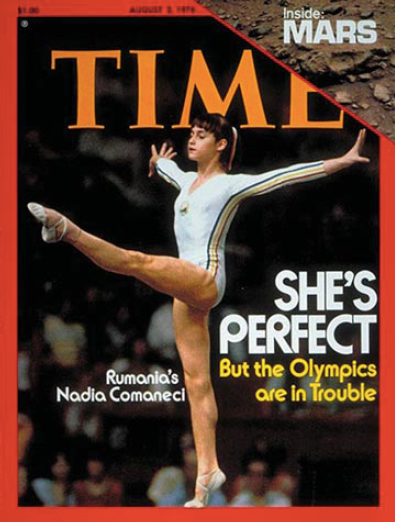 Actually,“A” is a wonderful grade – perfection! But maybe it should be reserved for, well, perfect performance. But how often does that happen?
Actually,“A” is a wonderful grade – perfection! But maybe it should be reserved for, well, perfect performance. But how often does that happen?
Jack is one of my gym buddies. We have gotten into the habit of giving grades to our workouts. Jack will say, “Well, how did you do today?” I might say,“Oh, today was only a C+.” Jack might reply,“Okay, well there’s always tomorrow.”
One day, in response to Jack’s caring query, I said,“Well, today was a B+”. Jack replied jokingly,“Oooh. You almost made it! What happened to those last few points?” After I left, I thought about Jack’s joking. I realized, however, that if I gave myself an “A”, well, I would be cheating myself. Why?
The “Perfect 10”
If you are as old as I am, you might remember Nadia Comăneci. She was the first gymnast in history to be awarded a “Perfect 10” in Olympic competition. Comăneci won a total of seven “Perfect 10s” during the 1976 Olympic games. Including Comăneci, since 1976, 36 Olympians have now scored at least one “Perfect 10” in gymnastics, a total of at least 85 “Perfect 10s” in all. In 2006, the International Olympics Federation changed the rules so that different gymnastics events are rated on an open-ended scale, taking into account level of difficulty and other factors. This has effectively eliminated the 10 point rating system, much to the dismay of some Olympic athletes.
So, no “Perfect 10s” before Comăneci – 85 after her. What happened? Did the athletes get better? Perhaps. If so, they didn’t rise en mass to such a level that athletes were able to reach perfection. What changed? Most likely the standards that raters used to define a “Perfect 10”.
This is not to take anything away from the Olympians who scored the “Perfect 10s”. I’m sure that they were great and certainly greater than I could ever hope to be. The point is: They simply weren’t perfect.
And the proliferation of perfect scores has an effect: It cheapens the “Perfect 10”. It not only cheapens the “Perfect 10”, it also cheapens the sport itself. How does it do this? It cheapens the sport by making perfection something that is more-or- less expected. When this happens, our attention is directed not toward the beauty and toil of the struggle to be better, it is directed toward whether or not the athlete succeeded or failed – whether she performed perfectly or not.
In fact, one of the reasons why the International Olympics Federation changed their rating system had to do with an incident in which pressure from fans prompted Olympic judges to change the score assigned to Alexei Nemov, a Russian gymnast. Fans expressed displeasure when Nemov was given a score on the Men’s Horizontal Bar that they felt was too low. The fans’ reaction caused a 15 minute halt in the games. As a result, the judges raised Nemov’s score. The crowd remained displeased until Nemov made an appeal to the fans to allow the competition to proceed.
The Humility of the Quest of Self-Perfection
The problem, of course, is that perfection, by definition, is something that can never actually be attained. No one is perfect. Nothing is perfect. Perfection is an ideal – it exists only in our individual and collective minds. Think of the perfect basketball player, the perfect essay, the perfect meal, the perfect society or the perfect spouse. They don’t exist – and they can’t exist. Perfection is something that we strive for, knowing that we can never fully attain it.
Some might ask,“If perfection is unattainable, then what’s the point? Isn’t the point to be the best we can be? If we always fall short, then why bother?”
Yes, the point is to be the best that we can be in whatever activity we are pursuing. Being the best we can be means being better than we were before. And although we can never be perfect, we need some idea of perfection in order to determine how well we have performed! If I have performed a better dance routine today than I did yesterday, I know this because I have moved closer to what I consider to be an ideal dance routine – the perfect dance routine. As a result, I am proud of my dance routine, even though I know that I have not reached perfection. Since I know that I cannot reach perfection, I am not just proud, I am also humble. My humility comes from my awareness that I have not yet reached perfection; I can still become more perfect. The game isn’t over. There is still more to strive for.
Appreciating the Moment on the Path of Self-Perfection
If I give myself an “A” on my workout, I have robbed myself of the opportunity to do better next time. The “Perfect 10” should either be unattainable or given only in the rarest of circumstances. Of course I’m not talking only about sports and fitness here. The same logic applies to anything that we do – especially our educational pursuits. What would happen if perfect grades – “A”s – were a true rarity. What would it mean if we all knew that our child at his or her near best could at best expect a B+ or an A-. What if every time we received that B+ we knew that we had done well – perhaps even exceptionally well – but the fact that we didn’t get the highest and most coveted grade meant that there is always room for improvement? What would happen if, when someone actually did receive the “Perfect A”, we were able to recognize it as a stellar achievement? What if we could celebrate that person’s achievement, and see it not as something that diminishes us but instead as an inspiration?
An unattainable “Perfect 10” reminds us that we can always be better, and that the nobility is in the progress that we make through our struggle and hard work. Each step that we make toward perfection is an occasion both for celebration and humility.


















